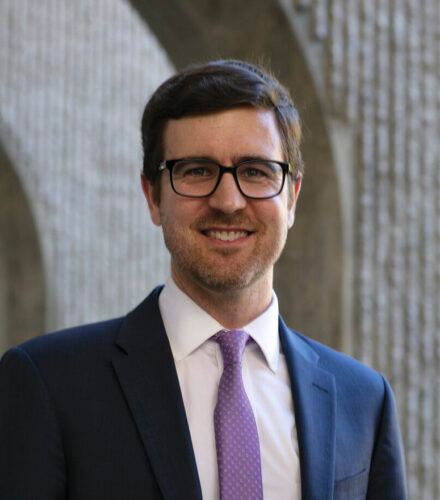Jud Campbell: Professor of Law and Helen L. Crocker Faculty Scholar
Illuminating the law through the lens of history
As a freshman at the University of North Carolina at Chapel Hill, Jud Campbell, JD ’11, started a one-man business doing genealogy research. He would happily spend his Saturdays in dusty archives searching for clues about a client’s distant family members.
Inspired by his archival work, the mathematics and political science major soon began writing history papers unrelated to his courses.

“I started writing history papers for fun,” says Campbell, a Virginia native who returned to SLS in June 2023 as a professor of law. “Historical work is all about solving puzzles. I loved doing the research and writing, and I wasn’t initially thinking about it as a career. It was just fun.”
In retrospect, it was pretty much a foregone conclusion that Campbell would end up in academia. He collected two master’s degrees from the London School of Economics on a Marshall Scholarship before receiving his JD from Stanford. After back-to-back federal clerkships, he returned to SLS in 2013 to serve for three years as the executive director of the Stanford Constitutional Law Center. Then it was back to Virginia for a professorship at the University of Richmond School of Law. “I was only going to leave for the best job, and Stanford was it,” he says.
While he was a student at SLS, Campbell made an early impression on former dean Larry Kramer, who hired Campbell as a teaching assistant for a summer class geared toward K-12 teachers about the U.S. Supreme Court.
“Jud is quiet, shy and reserved, and he is gentle in argument,” says Kramer, who was recently appointed president and vice chancellor of the London School of Economics. “He is also quite brilliant, and his capacity for work is astonishing. I watched him teach himself a great deal of history and law and put it into the kind of really original historical research that is all too rare in the academy. I also watched him work really effectively with other law students and with K-12 teachers. He put together materials for our course that were better than anything I could have done, and I still use them when I teach. Looking from the outside, one might think I mentored him, but it really was almost the opposite, and I felt like I learned a lot just watching him. On top of everything, he is the most genuinely nice person you will ever meet.”
Michael McConnell, the Richard and Frances Mallery Professor of Law and director of the Constitutional Law Center, also calls Campbell “an all-around nice guy who has already made major contributions to our understanding of rights, and especially speech.”
Novel Arguments on the Founders and Free Speech
Campbell’s scholarship explores the history of constitutional rights, including the First Amendment’s protection of free speech. He has leveraged his history credentials to make novel arguments about how the founders thought about the idea of rights and what they had in mind when drafting the First Amendment. “The founders’ understanding of the concept of rights, including natural and positive rights, would leave them completely confused by how we make decisions about freedom of speech today,” Campbell says. His 2017 Yale Law Journal article, “Natural Rights and the First Amendment,” drew widespread attention. Harvard Law School professor Cass Sunstein called his scholarship “the most illuminating work on the original understanding of free speech in a generation.”
“When we go back to founding-era sources and figure out how they thought about speech and press freedoms, it’s really important to recognize that sometimes they were talking about speech and press freedoms in terms of natural rights and sometimes they were talking about those things in terms of customary or common law rights,” Campbell says. “And we can get confused if we don’t keep straight which bucket of rights people had in mind.”
The founders would have assumed that speech could be restricted to promote the public good or to preserve norms of civility, Campbell explains, but that is largely because their vision of rights—where they emanate from, how they limit governmental power, and who gets to enforce them—was so different from our own. “The broader point of my work,” Campbell says, “is that we can’t understand earlier ideas about particular rights, like the freedom of speech, without appreciating broader shifts in how Americans have thought about the concept of rights.” SL
